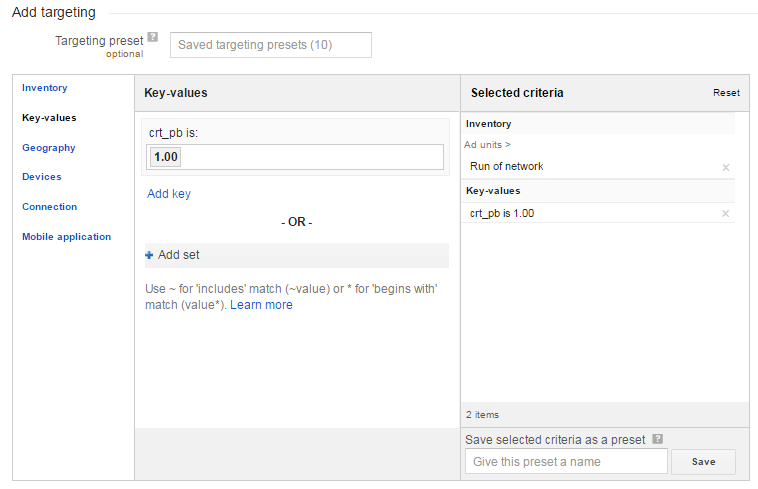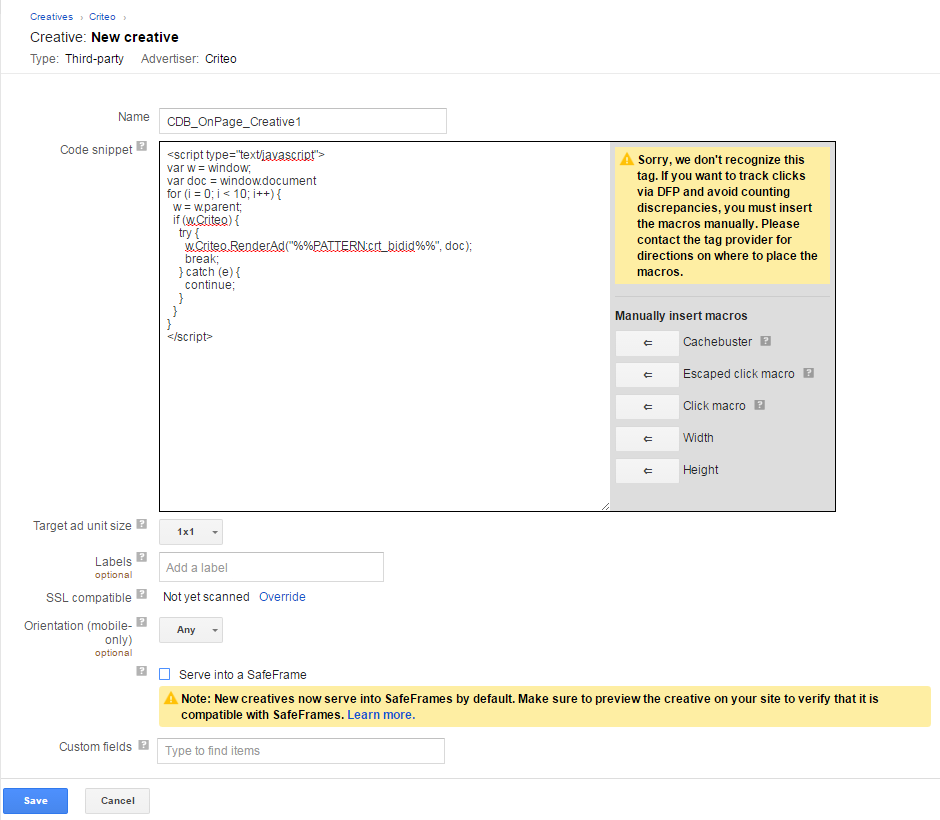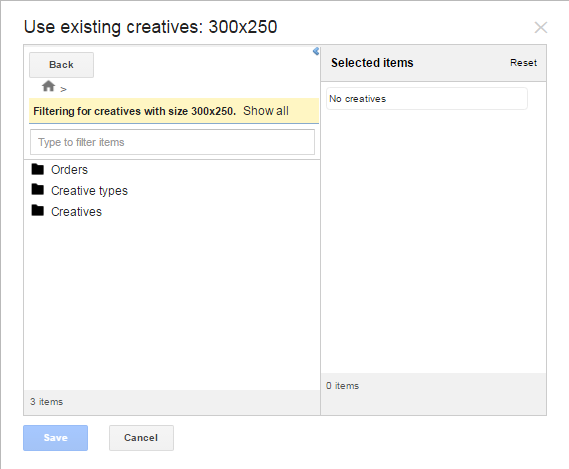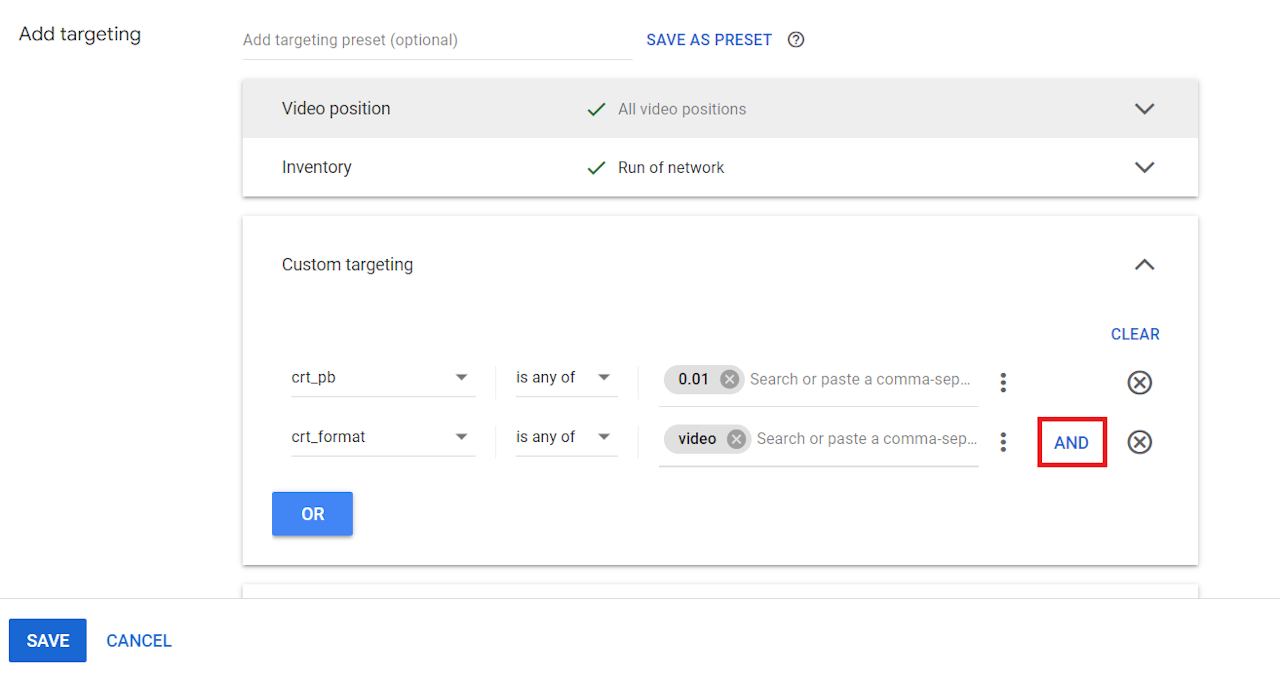
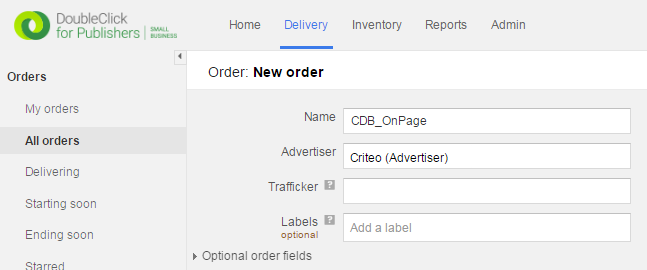
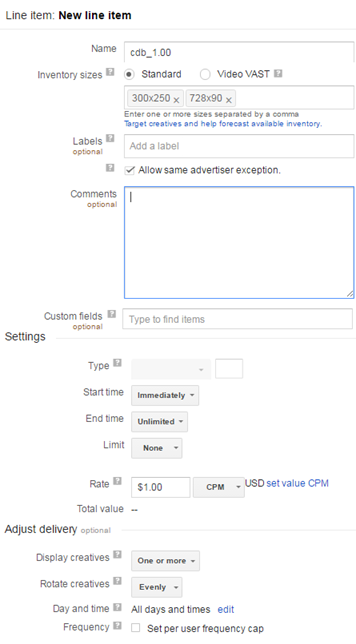
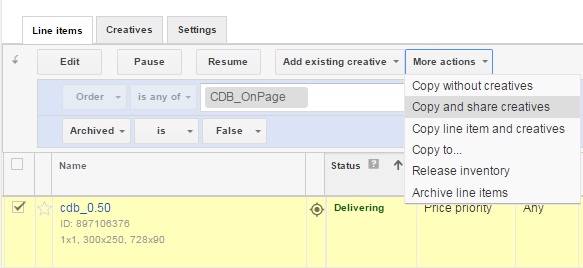

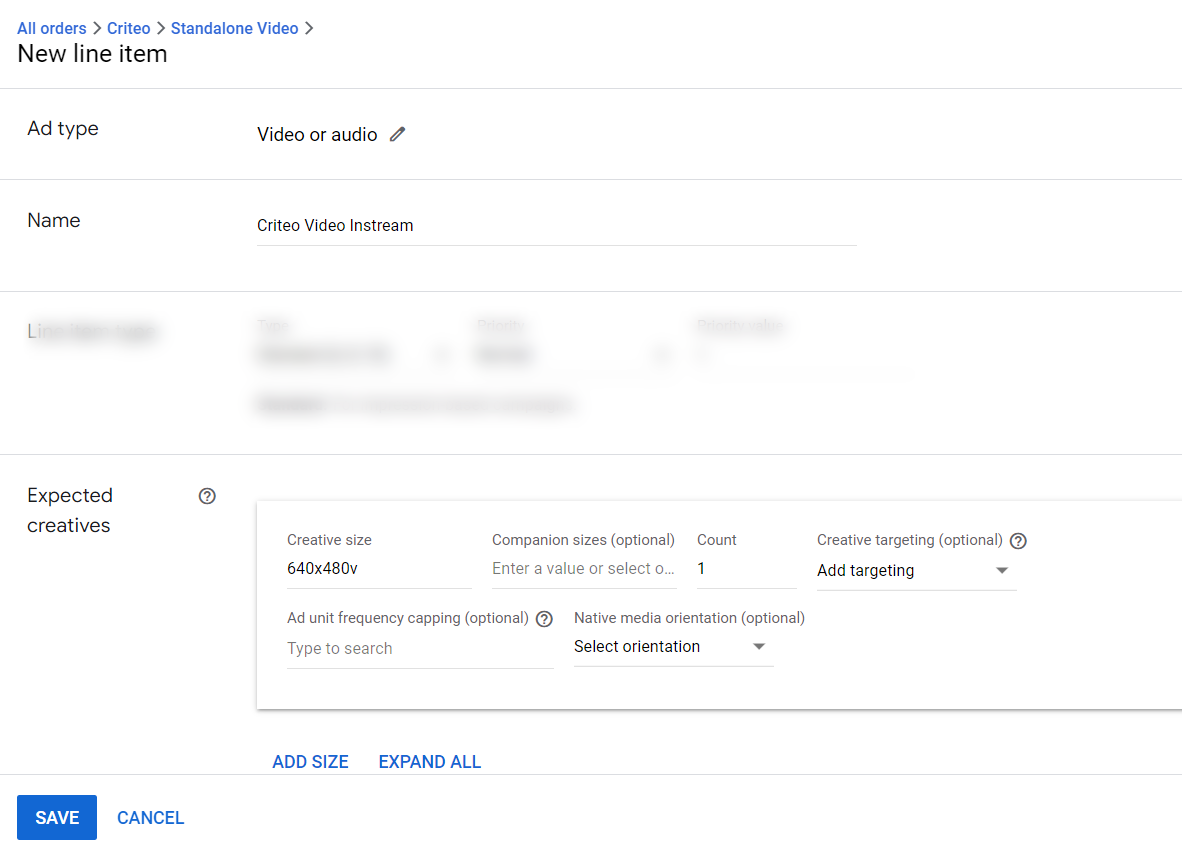
Introduction
Welcome! This document will explain integrating with Commerce Grid's Standalone / Publisher Tag solution.
Criteo provides a piece of code to be added in the header of the pages before the ad server callout. This generates an asynchronous call so Criteo can identify the user and return a bid. This information, including the bid price, is then sent to the adserver.
Criteo campaigns are targeted in the adserver based on Custom keyword criteria.
Requirements
You will receive from Criteo:
A script is to be placed on the header of your pages. Don't use the examples from this guide
Creative codes to be used in the adserver
We will need you to:
Implement the scripts on the page header
Update your adserver setup. Alternatively, your Criteo contact can provide an automated solution.
Create the line items for the different bid prices in your adserver
Implement the targeting rules and the creative code
Criteo complies with the IAB Consent Framework. Please refer to their documentation for more information and examples of certified CMPs.
Standalone Script - Loader
This code initializes the Criteo tags. The code will load the publishertag.js library and will also build the events queue that will be used later. The loader request is asynchronous and is cached on the user's browser. Please place this code before the DFP tags detailed below.
Standalone Script - Placement mapping info
Standalone Scripts - DFP tags
All you need to do now is to identify your existing DFP tags (see sample on the right) .
You can also find a working example on this page.
Standalone Scripts - Lazy load
For units that are loaded after the initial page load (i.e. lazy load, infinite scroll, single-page application rendering), pass the DFP slot(s) as an array through the placements field in the object that is passed in the RequestBidsOnGoogleTagSlots function.
This will cause requests to be sent only for specific placements instead of all placements on the page.
Field | Type | Description |
|---|---|---|
placements | Array | List of GPT slot objects |
Bid Request - Passing bid price floors
You can set bid price floors in the ad unit declaration by adding an extension object to the placements declared, as placements[].ext.floors. You can set floors per media type and per size as in the example on the left. You can use the wildcard character (“*”) to define a default floor for all sizes. Make sure to specify the currency in which the floor is expressed via the “currency” field, please note it is required and not specifying it will result in the floor being discarded and thus ignored.
User ID Collection
To enrich the bid request data with user IDs (1st party user IDs, 3rd party IDs, or hashed emails), please use the function Criteo.SetIdentities as described in the sections below.
This function accepts an array of OpenRTB EIDS objects as input:
Field | Type | Description |
|---|---|---|
source | String | Identifier source URL (publisher URL or vendor URL). |
uids[].id | String | User identifier |
uids[].atype | Integer | Identifier type. |
uids[].ext.stype | String | ID Source type. |
uids[].ext.persistence | String | (Optional, Criteo-specific) |
User ID Collection - First Party IDs
Use the function Criteo.SetIdentities providing the data below (examples on the right):
source: your domain
id: the user identifier
atype: Must be
1for cookie/device-based ID, must be3for person-based ID (e.g.: authenticated user ID, login ID, CRM/customer ID)ext.stype:
ppuidext.persistence:
jsorhttp
User ID Collection - Third Party IDs
Use the function Criteo.SetIdentities providing the data below (examples on the right):
source: the third-party solution domain
id: the user identifier
(recommended) atype:
1for cookie/device based ID,3for person-based ID (eg: authenticated user ID, login ID, CRM/customer ID)(optional) ext.persistence:
jsorhttp
User ID Collection - Hashed Emails
Use the function Criteo.SetIdentities providing the data below (examples on the right):
(optional) source: your domain or the domain of the solution operating on your behalf
id: the user data
atype:
3ext.stype: hashing algorithm used:
hemsha256,hemmd5,hemsha256md5. Please refer to the next section for details on hashing formats.
Hashing Formats
The hashing should be the users’ email address:
Encoded in UTF-8
Trimmed of any white space
Converted to lowercase
Hashed with MD5 / SHA256 / SHA256(MD5)
Example:
Type: String
Original Email: john.doe@gmail.com
SHA256: 375320dd9ae7ed408002f3768e16cb5f28c861062fd50dff9a3bff62e9dce4ef
MD5: e13743a7f1db7f4246badd6fd6ff54ff
SHA256 of MD5: 000e3171a5110c35c69d060112bd0ba55d9631c7c2ec93f1840e4570095b263a
Helpful links: https://www.miraclesalad.com/webtools/md5.php and https://www.miraclesalad.com/webtools/sha256.php
User ID Collection - Phone Numbers
Use the function Criteo.SetIdentities providing the data below (example on the right):
(optional) source: your domain or the domain of the solution operating on your behalf.
id: the user data
atype:
3ext.stype: hashing algorithm used
pnsha256.
HASHED PHONE NUMBERS
Phone numbers must be normalized to E.164 format and hashed using SHA256 before calling Criteo.SetIdentities.
CLEAR PHONE NUMBERS
Clear or unhashed phone numbers are not supported and must not be sent.

Adserver setup - Keywords
Go to Inventory > Key-values and click on New Key and create the key-value
Key name:
crt_pbValue type: Users will enter targeting values when creating line items or checking inventory. (Free-form)

Adserver setup - Order
Go to Delivery > All orders and click on New Order and create one new Order for the Commerce Grid campaign.

Adserver setup - First Line Item
You can create the first line on the same page. The goal is to create one dedicated line item per different CPM price bands.
We will create the unitary CPM for this first line item:
Name: Please use a self-explanatory name like
chb_1.00Inventory sizes: Please include all formats available on your page. Eg:
728x90,300x250Labels section: Please check
Allow same advertiser exceptionType: Please select the priority as agreed with your Criteo representative.
Start time:
ImmediatelyEnd time:
UnlimitedLimit:
NoneRate: Please include here the CPM. In this first example, we will use
$1.00Display Creatives:
One or More.Rotate Creatives:
Evenly
Finally, please select the inventory for the campaign and add the following targeting:
Type: Choose
Key-valuesSelect a key: Choose
crt_pbValue: Choose
isand input1.00
Finally, hit save and follow with the creative steps below.
Adserver setup - Creatives
Go to Delivery > Creatives > All creatives and click on Add creative and type the same advertiser name.
Type:
Third-partyName:
CDB_OnPage_Creative1Code snippet: paste the code located on the right
Size:
1x1Please un-tick the
SafeFramemode
Hit Save.
Go back to the first line item created, click on the Creatives tab and on use existing creatives.
Click on Show all and you will be able to list and include the recently created one.
Go back to this creative settings (Creatives tab > Click on the creative > Settings) and update the Size overrides with all the formats available on your page.
The last step is to duplicate this creative with as many unique ad units as you have on the same page. I.e.: Should you have up to 5 different ad units on your homepage, this means you will need to set up at least 5 creatives for this line item.
The easiest way to achieve this is by selecting one (or multiple) creatives and click on. More actions > Copy creative until you have the minimum amounts required.

Adserver setup - Remaining line items
Now that you have the first line item fully configured, you can simply duplicate it and reuse the existing creatives. Please contact your Criteo representative for an alternative automated solution. To proceed otherwise, go to the line item pages, select its respective checkbox, and click on More actions > Copy and share creatives. Repeat this action for all the different price bands you have.
Please don't forget to update:
The line item name
The CPM
The keyword targeting the respective price band
You can edit those values directly from the list page by clicking on the icon on the corner of each field:
Line item name
CPM
Inventory and keyword targeting
Start date. Please double-check this value, as the default one is the next day!
Once you are set, select all the new line items and click on the Resume button.
AMP
Criteo's solution is compatible with AMP RTC. Please refer to this dedicated AMP guide for more details.
Native Ads - Native Placement
In order to activate Native demand, first you need to implement a Javascript callback function that provides instructions on how the Native ad should be rendered. Please let your Criteo representative be aware of the function name, or simply name it nativeCallback as on the example aside.
Native Ads - Native Object
When native demand is available, Criteo will run the nativeCallback using the following Native object as argument:
NATIVE OBJECT
Field | Type | Description |
|---|---|---|
product | Product object Array | List of product assets. |
advertiser | Includes the adv name and logo | |
privacy | Includes adchoices and opt-out url | |
impression_pixels | Impression pixels object Array | List of impression pixels |
PRODUCT OBJECT
Field | Type | Description |
|---|---|---|
title | String | Product title. |
description | String | Product description. |
price | String | Product formatted price. It comes formatted by default with the currency symbol. |
click_url | String | Product landing page |
call_to_action | String | Product CTA |
image | Product image (400x400 px) |
IMAGE OBJECT
Field | Type | Description |
|---|---|---|
url | String | Image URL. |
height | Integer | Image height |
width | Integer | Image width |
ADVERTISER OBJECT
Field | Type | Description |
|---|---|---|
description | String | Advertiser name |
domain | String | Advertiser domain |
logo | Advertiser logo (200x200 px) |
PRIVACY OBJECT
Field | Type | Description |
|---|---|---|
optout_click_url | String | Opt-out landing page URL |
optout_image_url | String | Adchoices icon URL |
IMPRESSION PIXEL OBJECT
Field | Type | Description |
|---|---|---|
url | String | Impression pixel beacon |
Native Ads - Adserver integration
The campaigns are configured as the normal campaign and you can reuse the same Creative codes for the standard ads. The Criteo.RenderAd() function will automatically identify the native ad context and run the callback function that you have previously declared (nativeCallback on this example).
Native Ads - Ad requirements
Criteo Native guidelines:
Display the adchoices icon and implement the link to the opt-out page
Display at least one advertiser information (domain, name)
Display at least one product recommendation
Use Criteo click URLs
Every impression pixel must be called once the ad is delivered

Native Ads - Product Images
Criteo images for native inventory will be sized to fit within a 400x400 html element. They will not be padded to fit the dimensions or ratio, they should therefore be centered in the layout by the partner.
Native Ads - Complete example
You will find a full example on this page. Please check the source-code around the <h1>Native 1</h1> area
Video - Video Placement
Ad unit mapping is required for video. Make sure to properly set up the mediaTypes.video object as shown in the example. Refer to the Video Object for a full list of parameters.
Video - Video Object
Name | Scope | Description | Example | Type |
|---|---|---|---|---|
context | required | | instream | string |
placement | required | Video placement type. In-Stream: | 1 | integer |
playerSize | required | Width and height of the player | [640, 480] | Array |
mimes | required | List of the content MIME types supported by the player | ["video/mp4"] | Array |
protocols | required | Supported video bid response protocols. VAST 1.0: | [5, 6] | Array |
playbackmethod | required | Defines how the video inventory is initiated. Page Load with Sound On: | [4, 5] | Array |
skip | required | Ability from the video player for the user to skip the video. Not skippable: | 1 | integer |
api | required | API frameworks supported. VPAID 1.0: | [1, 2] | Array |
maxduration | required | Maximum ad duration in seconds | 20 | integer |
minduration | optional | Minimum ad duration in seconds | 5 | integer |
startdelay | optional | Duration offset (in second) from the start of the content for showing the video ad before the start of the Video. Pre-roll: | 5 | integer |
videoCallback | optional | Callback renderer used to render Outstream unit with publisher renderer (currently required for outstream!) | function(bid) {//Code to render outstream unit} | function |
Video - Video Instream
GOOGLE AD MANAGER INTEGRATION
The Criteo.SetDFPVideoKeyValueTargeting function is a helper method which will append Criteo key-values to your existing GAM Vast url. Once the url is enriched, it is ready to be passed to your instream player for rendering.
Note: The gamUrl in the example is a sample GAM Vast tag. Replace with your own Vast tag!
OTHER AD SERVERS INTEGRATION
The RequestBids callback will contain the returned bids where you will have access to the full bid object (i.e cpm, vastUrl) to handle as needed. Refer to Video Bid Object to see the list of parameters available.
Video - Video Outstream
For outstream rendering with your own renderer, make sure you've set up the videoCallback function in your Video Placement mapping.
Outstream integration is set up similarly to a standard banner integration. Bids are requested, and upon returned Criteo key-values are appended to the ad call.
Video - Video Bid Object
Name | Description | Example |
|---|---|---|
vastUrl | Criteo vast url | |
vastXml | Criteo vast Xml Creative | < Vast>...</ Vast> |
cpm | Bid price | 5.00 |
slotid | Id of the slot of the selected bid | video1 |

Video - Ad Server Setup
Outstream campaigns are configured exactly the same as the standard campaigns, using the same creative code. The Criteo.RenderAd() function will automatically identify the video ad context and run the video callback function that you have previously declared. If you already have banner integrated, the same line items can be reused. Refer to Adserver Setup for setup details.
Instream requires its own Video VAST line items. Please see below for setup details:
KEYWORDS
Go to Inventory > Key-values and click on New Key to create new key-values:
Name:
crt_pb(if not already created) andcrt_formatValue type:
Dynamic
ORDER
Go to Delivery > All orders and click on New Order to create a new Order for Criteo Video campaign.
Create a new Criteo Video Order.
LINE ITEM
Next create the first line item:
Choose Video as Ad Type.
Name: Use a self-explanatory name like Criteo Video Instream
Line Item Type: Select the priority type as agreed with your Criteo representative.
Expected creatives: Include all Video formats available. Eg:
640x480v,300x400vDelivery settings:
Rate: For our line item template, we'll use
0.01.Type: CPM
Select the inventory for the campaign and add a Custom targeting crt_pb with the same value that we put in the Rate field, i.e. 0.01. Please always use two decimals within the custom targeting as Google Ad Manager handles them as Strings and not real numbers. Add additional targeting to crt_format is any of video. Make sure to use the AND relation, not OR.
CREATIVES
Go to Delivery > Creatives, click on New creative and type the same advertiser name that you used to create Order, then choose Redirect as creative type.
On the next page, enter:
Name: Criteo Video Creative
Target ad unit size: Enter one of the inventory sizes, e.g.
640x480vVAST tag URL:
https://ssp-ads.criteo.com/redirect?url=%%PATTERN:crt_displayUrl%%Duration: 0
Skippable: Disabled
Hit Save.
Repeat this action for every inventory size you have on your site.
ADD CREATIVES TO LINE ITEM
Go back to the first line item created, click on the Creatives tab and on Existing creative, and you will be able to list and include the recently created ones.
Please repeat this action for every format you have configured.

